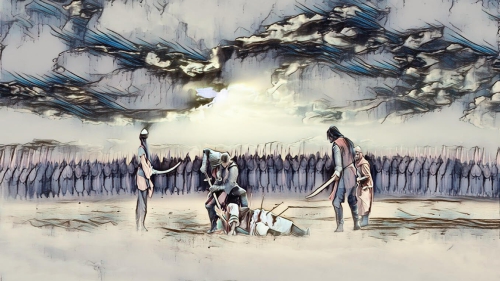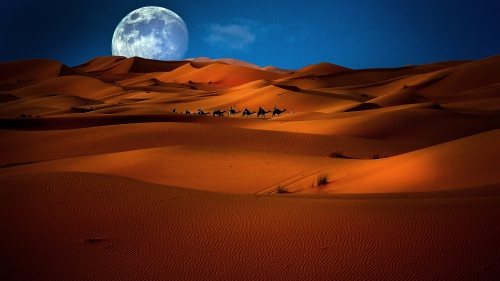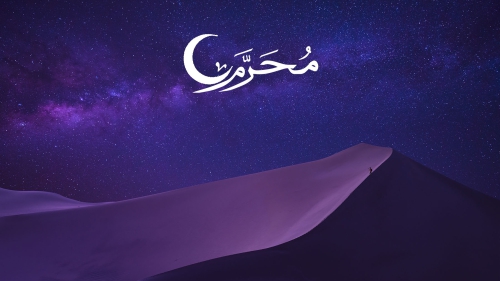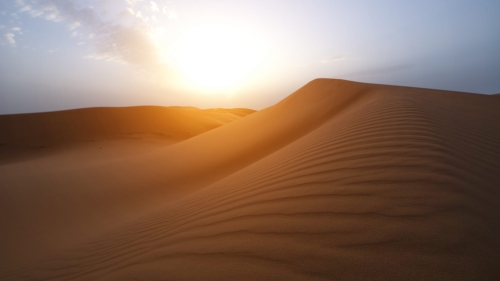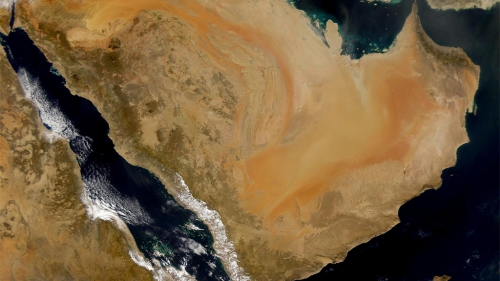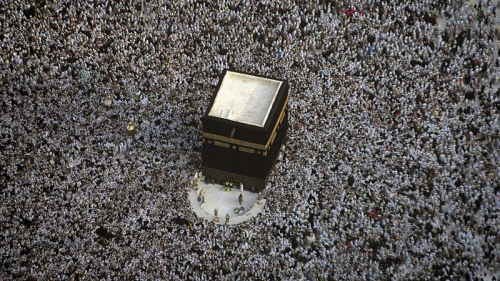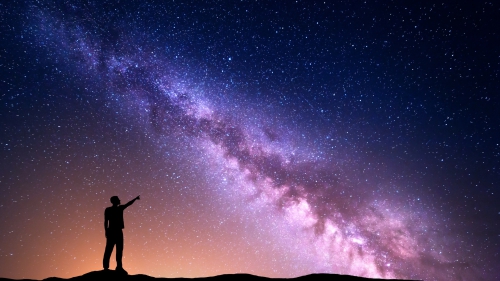Reviving Muslim Intellectual Position in the World

Introspection: Demand of the Time
According to the Quran a nation cannot hope to recover from its abyss unless it changes its inner self (called نفس (Nafs) by the Quran). Stopgap measures or doing patch-up job only to treat the symptoms (as many Muslim leaders seem to advocate) would only prolong suffering and would not cure the disease. A nation needs a fundamental change in its outlook, in its psychology, and in its attitude if it truly wants to change its destiny. The Quran says: إِنَّ اللَّـهَ لَا يُغَيِّرُ مَا بِقَوْمٍ حَتَّىٰ يُغَيِّرُوا مَا بِأَنفُسِهِمْ (13:11) – Allah does not change the condition of a people unless they change their inner selves. This is Allah’s law of change (8:53).
This change is required because a people going through a period of downfall suffer from slavish mentality: “They have hearts wherewith they understand not, eyes wherewith they see not, and ears wherewith they hear not. They are like cattle, – nay more misguided: for they are heedless (of warning).” (7:179)[Yusuf Ali]
A nation suffering from the mental maladies mentioned in the above verse cannot hope to recover its power of original thinking without changing its inner self. And without the power of original thinking, a nation that is down and being pushed around, as we are, cannot acquire power over its own world let alone acquiring power over the forces of the outer world.
Our individual scientific achievements, although worthy of appreciation, are without a central cohesive organization and really do not count much as far as recapturing the Muslim nation’s lost glory is concerned. These individual Muslim achievements are part of the grand scheme of whatever organization (for example, NASA) they may happen to be working for. For Muslim scientific achievements to be effective (like producing their own space shuttle), there needs to be an organizational structure that is organically related to the body of the Muslim Ummah, which possesses unique life of its own and not dependent on others.
Shift Needed in Purpose and Mindset
One way to achieve glory in science is through the philosophy of secularism being practiced by the West. The West achieved its scientific prowess only after giving God and Caesar their separate dues, and by assigning them two separate arenas of human thought: one for scientific thinking – done by people of science, and the other for religious thinking – done by people of religion. One was not allowed to interfere with the other. Religious people took charge of the Church and its hierarchy, and the science people took charge of Science and its hierarchy – resulting in polarized society.
Contrary to the approach practiced by the West, the past glory of Muslims in Science was not the result of separation of science and religion. Those revolutionary Muslim scientists were truly devoted to Islam while carrying out their scientific studies. There were no contradictions between their scientific thinking and their Islamic thinking. In fact, the driving force behind their scientific discoveries was the Quranic command to observe the signs of Allah spread throughout the Universe (3:189-191, 16:48, 21:30-32, 23:18, 26:7-8, etc.).
Therefore, if we are serious about changing our condition then we need to analyze our current situation. No matter how many Islamic conferences and workshops we organize and attend—and proclaim Allahu Akbar (Allah is Great!); no matter how many Hajj pilgrimages we perform and chant Allahumma Labbaik (O Allah! Here I am); no matter how much we pray and fast and recite the holy Quran; no matter how much we praise our Prophet (PBUH) and his companions; no matter how much we ask Allah to improve our condition; things will not improve for the Muslim Ummah— although all of the above are important—if we continue to tread the same path we have been on for the past thousand years, ever since we lost our preeminent position in the world of knowledge.
Our actions speak louder than our words. Our past actions have brought misery and consequent collapse of our knowledge base. If all we do is try to preserve our status quo, then how can we expect to recapture the glory of our historic achievements? How can simply repeating words (even if they are Quranic words) and performing religious rituals (even if done with sincerity) uplift us intellectually in this world? Intellectual advancement of any community requires hard work, dedication, conviction, commitment, organization, discipline, perseverance, creativity, innovation, and, above of all, unity of purpose and harmony in efforts.
Are we as a Muslim Ummah doing these things or simply claiming to be ‘practicing’ Muslims by performing the five pillars as a ritual while all the time trying—individually—to move up the economic or political or professional ladder? Why would Allah change our condition when we treat Islam as a ritual and are mostly interested in personal advancement? This is simply not the way of Allah. As noted above we need to make some fundamental changes in our outlook and psychology if we are serious about reclaiming our lost knowledge base (13:11).
Reverence of the past is one thing, but blindly following it is quite another. Opening online universities and teaching Muslim youth Fiqh and Shariah in the name of Islam (developed after more 200 years after the Prophet (PBUH)) is certainly not the way to reclaim our knowledge base. The Muslim Ummah must be willing to take some bold steps in its approach to modern knowledge. As Allama Iqbal says:
“The only course open to us is to approach modern knowledge with a respectful but independent attitude and to appreciate the teachings of Islam in the light of that knowledge, even though we may be led to differ from those who have gone before us (page 78). …The teaching of the Quran that life is a process of progressive creation necessitates that each generation, guided but unhampered by the work of its predecessors, should be permitted to solve its own problems (Page 134). …False reverence to past history and its artificial resurrection constitute no remedies for a people’s decay. ‘The verdict of history’, as a modern writer has happily put it, ‘is that worn-out ideas have never risen to power among a people who have worn them out.’ The only effective power, therefore, that counteracts the forces of decay in a people is the rearing of self-concentrated individuals. Such individuals alone reveal the depth of life. They disclose new standards in the light of which we begin to see that our environment is not wholly inviolable and requires revision (page 120).” [The Reconstruction of Religious Thought in Islam, page 120]
This poses a real challenge for the Ummah because the established religious hierarchy has historically opposed any such revision. Notwithstanding this opposition, the present tumultuous time is forcing us now in that direction. But the revision which Allama Iqbal is talking about cannot be undertaken without a Muslim intellectual revolution based on proper knowledge.
Strive for True, Objective Knowledge
But what is knowledge? This question is not as obvious as it seems. The Prophet (PBUH) used to constantly pray: “O Allah! Advance me in knowledge (20:114).” This means that knowledge is something special and sacred in its own right; and that advancing in knowledge is a challenge in which even our Prophet (PBUH) sought Allah’s help.
It is the duty of every Muslim therefore to acquire knowledge throughout life—so much so that on the Day of Judgment we will be held accountable for it. The Quran says: وَلَا تَقْفُ مَا لَيْسَ لَكَ بِهِ عِلْمٌ ۚ إِنَّ السَّمْعَ وَالْبَصَرَ وَالْفُؤَادَ كُلُّ أُولَـٰئِكَ كَانَ عَنْهُ مَسْئُولًا (17:36) –“And pursue not that of which thou hast no knowledge; for every act of hearing, or of seeing or of (feeling in) the heart will be inquired into (on the Day of Reckoning).” [Yusuf Ali]
The words hearing and seeing refer to human senses and the Arabic word فُؤَادَ (heart) refers to our mind. Hearsay is not knowledge because our senses and mind are not involved in arriving at the conclusion. Plato said that knowledge gained through the senses is not reliable, whereas the Quran says that anything not verified by the senses and mind cannot be regarded as knowledge. This shows how valuable sense perception is in Islam.
The Quran puts extraordinary emphasis on objective knowledge. The revelation of the Quran may be thought of as marking the birth of inductive intellect. Inductive reasoning allows human beings to master the forces of the natural world. The Quran created and fostered a spirit of critical observation of the forces of nature: إِنَّ فِي خَلْقِ السَّمَاوَاتِ وَالْأَرْضِ وَاخْتِلَافِ اللَّيْلِ وَالنَّهَارِ لَآيَاتٍ لِّأُولِي الْأَلْبَابِ; الَّذِينَ يَذْكُرُونَ اللَّـهَ قِيَامًا وَقُعُودًا وَعَلَىٰ جُنُوبِهِمْ وَيَتَفَكَّرُونَ فِي خَلْقِ السَّمَاوَاتِ وَالْأَرْضِ رَبَّنَا مَا خَلَقْتَ هَـٰذَا بَاطِلًا (3:190-191– In the creation of the earth and the heavens and the alternation of night and day, there are signs for those gifted with insight. These people always keep in mind Allah’s law while standing, sitting or reclining. They constantly reflect upon the creation of the heavens and the earth: “O our Sustainer! Thou have not created this Universe in vain or for destructive purposes.”
It is also clear (as noted in the previous article https://www.islamicity.org/17138/western-thinkers-view-on-early-muslim-scientists/) that the birth of observation and experimental science in Islam was due not to a compromise with Greek thought but to a prolonged intellectual fight with it. Again, according to Allama Iqbal: “Socrates concentrated his attention on the human world alone. To him the proper study of man was man and not the world of plants, insects, and stars. How unlike the spirit of the Quran, which sees in the humble bee a recipient of Divine inspiration and constantly calls upon the reader to observe the perpetual change of the winds, the alternation of day and night, the clouds, the starry heavens, and the planets swimming through infinite space! As a true disciple of Socrates, Plato despised sense- perception which, in his view, yielded mere opinion and no real knowledge. How unlike the Quran, which regards ‘hearing’ and ‘sight’ as the most valuable Divine gifts and declares them to be accountable to God for their activity in this world.” [The Reconstruction of Religious Thought in Islam, page3]
The importance of inductive reasoning is so great in the eyes of the Quran that at numerous places it calls those who do not use it as animals—and even worse than animals: “For the worst of beasts in the sight of Allah are the deaf and the dumb, those who understand not.” (8:22) “Many are the Jinns and men we have made for Hell: They have hearts wherewith they understand not, eyes wherewith they see not, and ears wherewith they hear not. They are like cattle, nay more misguided: for they are heedless (of warning).” (7:179) “Or thinkest thou that most of them listen or understand? They are only like cattle; nay, they are worse astray in Path” (25:44). “Ah! Ye are those who fell to disputing (Even) in matters of which ye had some knowledge! But why dispute ye in matters of which ye have no knowledge?” (3:66) [Yusuf Ali]
A beautiful hadith of the Prophet (PBUH) may also shed important light on this issue. The Prophet (PBUH) is reported to have said: “O Allah! Grant me knowledge of the ultimate nature of things!” [“Allahumma arina haaqa’iq al-ashya kamaa hiya.”] Are we, as followers of the Prophet (PBUH), practicing this hadith in our daily lives? Are we trying to acquire the knowledge of the ultimate nature of things and then teaching its importance in Islam to our youth? Who are the real Ulema in Islam: the religious scholars, or those who have knowledge of the ultimate nature of things?
The Quran says: “Seest thou not that Allah sends down rain from the sky? With it We then bring out produce of various colors. And in the mountains are tracts white and red, of various shades of color, and black intense in hue. And so amongst men and crawling creatures and cattle, are they of various colors. Those truly fear Allah, among His Servants, [Ulema] who have knowledge: for Allah is Exalted in Might, Oft-Forgiving.” (35: 27-28) [Yusuf Ali]
That is, the Quran calls those who have knowledge of fields such as hydrology, botany, geology, zoology, physiology, or anthropology as Ulema. Allah asks believers to acquire knowledge of His signs throughout the Universe, which practically includes almost every imaginable field of science such as chemistry, physics, astronomy, cosmology, neurology, medicine, psychology, geography, oceanography, etc. (e.g., 3:189-191, 16:48, 21:30-33, 23:18, 26:7-8, and many other verses). In other words, Ulema according to the above verses are scientists and thinkers, not religious scholars. Allah clearly warns us in the Quran that those who have knowledge and those who do not cannot be deemed equal (39:9). How are we justified then in calling our traditional religious scholars Ulema who have no knowledge of Allah’s signs in the Universe, especially when more than 750 verses in the Qur’an deal with such knowledge, while only some 130 verses deal with prayer, fasting, pilgrimage, and laws governing personal affairs?
In fact, the current bifurcation of knowledge into Islamic and non-Islamic is alien to Islam itself. When the Prophet (PBUH) exhorted his followers to acquire knowledge—even if they had to travel to China—he did not distinguish between Islamic knowledge (represented by religious scholars) and non-Islamic knowledge (represented by scientists). This division of knowledge is rather a later creation in Islam. Striving for knowledge without creating any contradistinction between outer and inner worlds is an Islamic duty of all Muslims. In the ultimate nature of things these two worlds reside in perfect harmony. When the Prophet (PBUH) said that those who travel to seek knowledge get ten rewards for every step, he meant that seeking knowledge is a divine act in itself. We should therefore teach our children that when they learn any subject in school or college they are, first and foremost, engaged in a divine act and prayer. All other career benefits that eventually accrue from learning should be considered side-benefits.
Holistic Approach to Knowledge
We need to go back to the way of the Prophet (PBUH) and use this integrated or holistic approach to knowledge which, apart from giving us power over the natural world, also deepens our faith in the non-physical world. The Quran emphasizes that signs of Allah in the Universe are meant to strengthen the faith of believers: “Verily in the heavens and the earth, are Signs for those who believe. And in the creation of yourselves and the fact that animals are scattered (through the earth), are Signs for those of assured Faith.” (45: 3-4) [Yusuf Ali]
“Do they not look at the birds, held poised in the midst of (the air and) the sky? Nothing holds them up but (the power of) Allah. Verily in this are signs for those who believe.”(16:79) [Yusuf Ali]
“Do not the Unbelievers see that the heavens and the earth were joined together (as one unit of creation), before we clove them asunder? We made from water every living thing. Will they not then believe?” (21:30) [Yusuf Ali]
“Behold! In the creation of the heavens and the earth; in the alternation of the night and the day; in the sailing of the ships through the ocean for the profit of mankind; in the rain which Allah Sends down from the skies, and the life which He gives therewith to an earth that is dead; in the beasts of all kinds that He scatters through the earth; in the change of the winds, and the clouds which they Trail like their slaves between the sky and the earth;- (Here) indeed are Signs for a people that are wise.” (2:164) [Yusuf Ali]
Our ancestors read these verses and laid the foundations of science, astronomy, mathematics, medicine, geography, sociology, anthropology and science of history among other things. Every sign of Allah in the Universe inspired them to deliberate and ponder, which deepened their faith in Allah. We, on the other hand, read these same verses and move on. At most we think that we have earned the mercy of Allah in the other World by reciting these verses while simultaneously living in this World at the mercy of others. Our ancestors dedicated their lives to discover the signs of Allah (i.e., forces of nature) and proved to humanity the Truthfulness of the message contained in these verses (according to verse 41:53). As a result, they became leaders and torchbearers of knowledge in the World. We, on other hand, abandoned that tradition and consequently are groping in darkness – and trying, if at all, to illuminate our way with borrowed light.
According to another hadith of the Prophet (PBUH) the whole World is a Mosque. This does not only mean that we can pray anywhere on Earth as most of us think; it also means what we do in Mosques and what we do outside must be solely for Allah (72:18). Thus, to a Muslim there should be no bifurcation of life into secular and religious. Whether teaching or learning, working or resting, praying or playing, eating or drinking, standing or sitting—in short, every moment of our lives should be lived in the context of Islam. This is how we become God-conscious. This is how we should practice Islam: by total submission to the Will of Allah in every aspect of our lives. It does not just mean that we should keep doing what we are doing sincerely and honestly and give charity, pray, fast and perform the pilgrimage and feel that we have discharged our obligation to Islam. That is the easy part. Doing all those things is only a starting point for a much larger obligation: to keep advancing in knowledge of the ultimate nature of things. This larger goal should never be overlooked. If the Prophet (PBUH) was doing this his entire life, we must try as well. This is the difficult as well as challenging part: how to keep advancing in knowledge, each and every one of us, until we breathe our last breath. That is where we constantly need to seek help from Allah as, indeed, the Prophet (PBUH) did.
This is the essence of the relationship of Islam and Science: opening the door of the Other World by using the Key of this World. And the Key is knowledge of the Universe. The goal of Muslims should always be to gain knowledge of the forces of nature and spend it without any discrimination for the benefit of the whole world. The world being a Mosque there should be no discrimination. This is how we can regain our crowning intellectual position in the world. This is how we can create Heaven on Earth.
Topics: History, Iman (Faith And Belief), Islam And Science Values: Knowledge, Spirituality, Wisdom
Views: 4357
Related Suggestions






